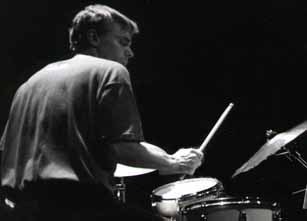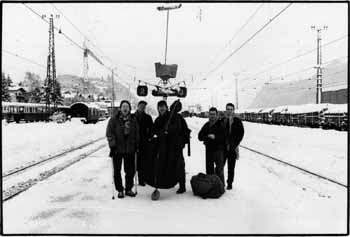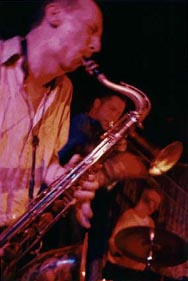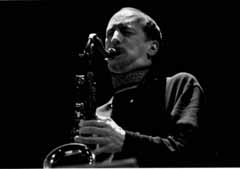Point of Departure by
William Shoemaker
Gerry Hemingway: On the Road, on the Net
Interviewing a musician on tour can be daunting: often, five
or ten minutes in a dressing room or a hotel lobby is all
a journalist can get. Usually, the musician is exhausted,
so any question more complex than "Who are your influences?"
may prove to be excruciatingly difficult to answer. It can
be frustrating for all parties.
 Percussionist-composer Gerry
Hemingway, however, can pack a lot of information into a
ten-minute interview ... if you can catch him. Hemingway
is a classic road warrior, criss-crossing North America, Europe, and
Japan several times a year with his own Quartet, co-op bands like BassDrumBone
(with Ray Anderson and Mark Helias), and Say No More (with Mark
Dresser, Phil Minton and Bob Ostertag), anchoring bands like Frank Gratkowski,s
trio, and producing concerts of his chamber music.
Percussionist-composer Gerry
Hemingway, however, can pack a lot of information into a
ten-minute interview ... if you can catch him. Hemingway
is a classic road warrior, criss-crossing North America, Europe, and
Japan several times a year with his own Quartet, co-op bands like BassDrumBone
(with Ray Anderson and Mark Helias), and Say No More (with Mark
Dresser, Phil Minton and Bob Ostertag), anchoring bands like Frank Gratkowski,s
trio, and producing concerts of his chamber music.
Luckily, Hemingway is one of an increasing number of musicians
connected to the Internet. His well-designed Website -- http://www.gerryhemingway.com --
is loaded with information and links to other cool sites.
He is also a hard core e-mailer, who books his North American
tours, makes travel arrangements, etc., on line. So, to bypass
the shortcomings of the proverbial ten-minute interview, it was suggested
to Hemingway that an e-mail interview might prove interesting. He
was game. Over a two-month period, questions and answers shot
through cyberspace; Hemingway's last response was posted
shortly after his performance at the 1998 Tampere Jazz Happening
(Finland) with Robert Dick's Jazz Standards from Mars project.
Hemingway's new quartet can be heard on Johnny's Corner Song
(Auricle), available directly from Hemingway's Website.
 Bill
Shoemaker: You had a long-standing band with Michael
Moore et al that really allowed you to develop a trajectory
of ideas over several years. There is something of a shift
with the new quartet; there are some recognizable elements
from your earlier work and some new elements, too. For you,
what are the strains of continuity and changes in your compositions
for the quartet? How much do the respective personalities of the
musicians shape the work? And, as a player, you're dealing with
old pals like Ray Anderson and Mark Dresser, and a new cohort
in Ellery Eskelin; what are the challenges of such a chemistry?
Bill
Shoemaker: You had a long-standing band with Michael
Moore et al that really allowed you to develop a trajectory
of ideas over several years. There is something of a shift
with the new quartet; there are some recognizable elements
from your earlier work and some new elements, too. For you,
what are the strains of continuity and changes in your compositions
for the quartet? How much do the respective personalities of the
musicians shape the work? And, as a player, you're dealing with
old pals like Ray Anderson and Mark Dresser, and a new cohort
in Ellery Eskelin; what are the challenges of such a chemistry?
Gerry Hemingway: The idea
of the quartet was borne out of the success of the "Down
to the Wire" tour which was to be a quintet tour but our
cellist Ernst Reiseger slipped a disk a day before the first
rehearsal so we had no way to really replace him. I hurriedly
rearranged the pieces for the quartet instrumentation and
by the end of the tour, I and the rest of the group were
genuinely pleased with the openness of this configuration.
As the quintet's repertoire expanded and developed in the years
that followed I had always in the back of my mind the itch
to explore the quartet setting more. As I got more familiar
with Ellery's gifts as an improviser, the notion of teaming
him with Ray became an irresistible concept. I felt there
would be a rich chemical reaction in combining their two
sounds and energies. And that was encouraged by their enthusiasm
in playing together. Nonetheless it took some gigs to sort
out our collective sound and approach. My music has many
passages that are densely intertwined with collective improvising
and interpreting and it can take a minute to navigate the
sometimes bumpy road to in mutually engaged music.
 Despite the fact that I have
played with Ray for a long time, and in many settings, this
was the first time he was doing my music exclusively. My own
band differ in substantial ways as far as content to BassDrumBone
of we entered into a new phase of our relationship in the
context of this tour. I think this situation is particularly
suited to getting a big range of Ray's tremendous gifts on
the trombone. And I think the more extended room for us to
explore solo statements offered much mutual inspiration for each
of us to reach a little deeper in the vault to see what could
be created.
Despite the fact that I have
played with Ray for a long time, and in many settings, this
was the first time he was doing my music exclusively. My own
band differ in substantial ways as far as content to BassDrumBone
of we entered into a new phase of our relationship in the
context of this tour. I think this situation is particularly
suited to getting a big range of Ray's tremendous gifts on
the trombone. And I think the more extended room for us to
explore solo statements offered much mutual inspiration for each
of us to reach a little deeper in the vault to see what could
be created.
Some of the repertoire is new but most of the repertoire of
the quartet is adapted from the Down to the Wire book and/or
the unreleased quintet recording Waltzes, Two-Steps and other
Matters of the Heart. I am happy with how the pieces have
changed in this new context. Then again I always have been
open to what happens when you put stuff up on the bandstand, sometimes
taking the suggestions that come from accidents, practical frustrations,
acoustics, egos and some burning blowage, to help from a more
successful piece of music.
Shoemaker: A lot of what
you are saying confirms my sense that percussionists bring
unique qualities to the table as composer-bandleaders. I
think it has to do with the intrinsic high-level listening required
of a drummer; it gives them a clear read on how the ensemble
chemistry is evolving. I think that's a reason you have been very successful
at writing to your colleagues' strengths and personalities. At the
same time, you experiment with structural features in your compositions
and pursue materials that reflect interests you would be pursuing
no matter who was in the band. I like what I hear as a resulting combination
of these two strands in your pieces, something of a combination
of familiarity and, for lack of a better work, strangeness . By
familiarity, I mean a recognizable GH voice, particularly in the thematic
materials; by strangeness, I mean seemingly open-ended or process-oriented
sections of the work that probably changes markedly from
night to night. Is this a balance you consciously try to deal
with?
Hemingway: Well, when I
think of the continuum of drummers and their listening abilities,
high-level listening is not the first quality that leaps
to my mind. Producing the musical material that gives a ground
is not necessarily an interactive experience, except perhaps
with the rhythm section. Often most of the band tries to
get with the feel the drums produce, at least that's what
I have observed with those who have played with Elvin or
Buhaina, not the other way around. But there are many, myself
included who listen and respond with a commitment to making an ensemble
music, where what counts is a balance of initiation and reaction. And
certainly to that point, I have an agenda, as a composer, to seek
an integration of my sonic imagination and the unique way
someone I am working with states a left turn.
In the many years the quintet has been contending with my penmanship, there
has been a natural give and take that comes with the process of crafting
a successful performance. Ultimately I make most of the decisions that
affect the orchestration, the timing of events, the dynamics and
so forth. The flow and shape of the improvised material is
mostly dictated by the notated material which is inherently
responsible for establishing a musical context for musical
invention. Process in the sense of what we fondly refer to
as blowage (improvisation), is not what I would call open ended,
as far as the quintet repertoire is concerned. Nor is it strictly codified
either as Ellington was want to do. Somewhere in-between, is where,
for me, the tension remains that keeps things both in and out
of control simultaneously.
The quartet is by my design a more open ended bargain, though
after forty gigs I noticed a kind of classicism emerging
in the "open" sections. I guess I must accept that
my writing has this tendency built in, or perhaps the players
I choose have compositional leanings. But my direction with the
quartet is decidedly in favor of the soloist having more control
over the musical outcome. Here the unexpected is more welcome.
The challenge for me as a composer is to make the platform
for playing flexible enough to support a higher degree of
chaos while sustaining musical coherence and form.
Shoemaker: I have a sense
of what you mean by "a kind of classicism" in the
open sections of your pieces. To my ear, Ellery is a very classical player,
if you accept the Webster-Shepp trajectory as such; however, mine is
surely a minority view among US critics. But, since classicism
is now a hot-button topic in the US, I would be interested
in hearing you expand on your perception of, and/or criteria
for, classicism in the jazz tradition, and how you hear that
manifested in the work of you and cohorts.
Hemingway: My meaning of
"classicism" in the way I just used it means only that
there is tendency to formalize improvised expositions, often because their
context is not one of limitless options. The music I write sets
up clear initiatives for the players for the most part. Even
the quartet repertoire, which as I said before is more open
than that of the quintet, when played night after night tends
to find it's "groove", by which I mean, successful
excursions from the material are accumulated, combined and
refined into shapes that work well with the given musical structure.
 It's interesting that you find
Ellery to have classical tendencies in that his sound has
references we can identify within the trajectory you have brought
up. Ellery comes from a family, particularly his mother, for whom jazz
music was not just the choice of music on the record player but
the central source of employment for his parents. So he really
lived in a very "traditional" upbringing in jazz
music of the 50s/60s and as he has developed his voice he
has explored just about every other aspect of music making
that he was only peripherally aware of in his earlier years. So
he often struggles with his past roots and new found tendencies,
which I feel create a very vital, searching and open minded
music, one I obviously admire.
It's interesting that you find
Ellery to have classical tendencies in that his sound has
references we can identify within the trajectory you have brought
up. Ellery comes from a family, particularly his mother, for whom jazz
music was not just the choice of music on the record player but
the central source of employment for his parents. So he really
lived in a very "traditional" upbringing in jazz
music of the 50s/60s and as he has developed his voice he
has explored just about every other aspect of music making
that he was only peripherally aware of in his earlier years. So
he often struggles with his past roots and new found tendencies,
which I feel create a very vital, searching and open minded
music, one I obviously admire.
Can't say that open minded is the first thing I think of with
the more hot button, "it don't mean a thing, if it ain't
got that swing" crowd. Its really a pity that a "groove"
must be so limited in it's definition. I just simply feel
that music and life swings when there is a connection you can feel
but you can't quite describe.
Bill Shoemaker's column, Point of Departure,
is a regular feature of the Madrid-based Cuadernos de Jazz,
the world,s leading Spanish language jazz magazine. A Spanish
translation of this article appeared in the January/February
1999 issue. Copyright 1999 Bill Shoemaker, not to be reproduced
in any format without the expressed permission of the author.
Back to Links Page
 Percussionist-composer Gerry
Hemingway, however, can pack a lot of information into a
ten-minute interview ... if you can catch him. Hemingway
is a classic road warrior, criss-crossing North America, Europe, and
Japan several times a year with his own Quartet, co-op bands like BassDrumBone
(with Ray Anderson and Mark Helias), and Say No More (with Mark
Dresser, Phil Minton and Bob Ostertag), anchoring bands like Frank Gratkowski,s
trio, and producing concerts of his chamber music.
Percussionist-composer Gerry
Hemingway, however, can pack a lot of information into a
ten-minute interview ... if you can catch him. Hemingway
is a classic road warrior, criss-crossing North America, Europe, and
Japan several times a year with his own Quartet, co-op bands like BassDrumBone
(with Ray Anderson and Mark Helias), and Say No More (with Mark
Dresser, Phil Minton and Bob Ostertag), anchoring bands like Frank Gratkowski,s
trio, and producing concerts of his chamber music.  Bill
Shoemaker: You had a long-standing band with Michael
Moore et al that really allowed you to develop a trajectory
of ideas over several years. There is something of a shift
with the new quartet; there are some recognizable elements
from your earlier work and some new elements, too. For you,
what are the strains of continuity and changes in your compositions
for the quartet? How much do the respective personalities of the
musicians shape the work? And, as a player, you're dealing with
old pals like Ray Anderson and Mark Dresser, and a new cohort
in Ellery Eskelin; what are the challenges of such a chemistry?
Bill
Shoemaker: You had a long-standing band with Michael
Moore et al that really allowed you to develop a trajectory
of ideas over several years. There is something of a shift
with the new quartet; there are some recognizable elements
from your earlier work and some new elements, too. For you,
what are the strains of continuity and changes in your compositions
for the quartet? How much do the respective personalities of the
musicians shape the work? And, as a player, you're dealing with
old pals like Ray Anderson and Mark Dresser, and a new cohort
in Ellery Eskelin; what are the challenges of such a chemistry?
 Despite the fact that I have
played with Ray for a long time, and in many settings, this
was the first time he was doing my music exclusively. My own
band differ in substantial ways as far as content to BassDrumBone
of we entered into a new phase of our relationship in the
context of this tour. I think this situation is particularly
suited to getting a big range of Ray's tremendous gifts on
the trombone. And I think the more extended room for us to
explore solo statements offered much mutual inspiration for each
of us to reach a little deeper in the vault to see what could
be created.
Despite the fact that I have
played with Ray for a long time, and in many settings, this
was the first time he was doing my music exclusively. My own
band differ in substantial ways as far as content to BassDrumBone
of we entered into a new phase of our relationship in the
context of this tour. I think this situation is particularly
suited to getting a big range of Ray's tremendous gifts on
the trombone. And I think the more extended room for us to
explore solo statements offered much mutual inspiration for each
of us to reach a little deeper in the vault to see what could
be created.  It's interesting that you find
Ellery to have classical tendencies in that his sound has
references we can identify within the trajectory you have brought
up. Ellery comes from a family, particularly his mother, for whom jazz
music was not just the choice of music on the record player but
the central source of employment for his parents. So he really
lived in a very "traditional" upbringing in jazz
music of the 50s/60s and as he has developed his voice he
has explored just about every other aspect of music making
that he was only peripherally aware of in his earlier years. So
he often struggles with his past roots and new found tendencies,
which I feel create a very vital, searching and open minded
music, one I obviously admire.
It's interesting that you find
Ellery to have classical tendencies in that his sound has
references we can identify within the trajectory you have brought
up. Ellery comes from a family, particularly his mother, for whom jazz
music was not just the choice of music on the record player but
the central source of employment for his parents. So he really
lived in a very "traditional" upbringing in jazz
music of the 50s/60s and as he has developed his voice he
has explored just about every other aspect of music making
that he was only peripherally aware of in his earlier years. So
he often struggles with his past roots and new found tendencies,
which I feel create a very vital, searching and open minded
music, one I obviously admire.